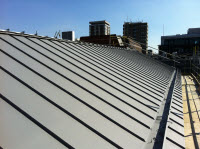
Although all types of metals are recyclable, some metals tend to corrode due to exposure to several elements in the environment. On the other hand, zinc alloys are capable of absorbing carbon dioxide by locking the gas away in a special protective surface layer made of zinc carbonate. Moreover, zinc carbonate is responsible for giving the panels a bluish patina, which is unique to the type of environment this metal is placed. The patina is formed when zinc reacts with oxygen and water, and this protects the metal by allowing it to reform naturally when scratched by accident.
Benefits of Zinc Roofing
When used as a roofing material, zinc offers a number of environmental benefits including the following:
1. The production of zinc consumes less energy, as compared to other types of metals.
Among all non-ferrous types of metals, the consumption of energy is quite low when zinc is produced. In fact, the amount of energy consumed is less when the metal is made from recycled materials. On the other hand, copper, stainless steel and aluminum use up about twice or four times as much energy.
2. The metal requires low levels of fuel during the fabrication process.
Zinc has a naturally low melting point of about 785 degrees F, and only a low fuel level is needed to extract, alloy, smelt, and fabricate this metal.
3. Zinc is a recyclable material.
Zinc is entirely recyclable, which means recycled zinc can conserve at least 95 percent of the initial energy content of this metal. Upon reaching the end of its lifespan, the material may be recycled without causing loss of properties or degradation.
4. Zinc roofing can last for years.
Zinc is known for its impressively long lifespan and less needs for replacement and repairs. In fact, properly installed roofs made of zinc can last for centuries.
5. It is cheaper to ship zinc because it is lightweight.
This type of metal has lightweight features, which translates to cheaper shipping costs, as compared to bricks or stone.
6. Zinc has low toxicity levels.
Based on industry sources and researchers, zinc roof has a non-toxic runoff, which makes the metal low in toxicity level. In addition, zinc is a nature-friendly and non-corrosive metal that comes with a 100 percent clear water runoff.
7. Zinc is malleable and sturdy.
As compared to other types of metals used as building materials, zinc alloy is naturally soft. Furthermore, zinc alloy has the same patina and malleability as with natural zinc.
8. This type of metal can be formed easily into various shapes.
Because of the natural softness of zinc, it is possible to use simple hand tools to change its form. In fact, it is easy to alter its shape and curve unlike other metals.
Disadvantages of Zinc Roofing
Although zinc is renowned for its numerous benefits and impressive features, there are some things you need to consider when using this type of metal for your roof. For instance, experts claim that there are certain issues with corrosion from the underside portion of zinc roofing due to condensation of moisture. If your roofing system has a design that allows warm and moist air to travel upwards through the roof’s insulation, sheathing and framing, water vapor may fall out of the air and remain trapped when warm air cools down.
Moreover, zinc may corrode when the condition is not suitable for the patina to form. The same holds true if water is allowed to remain on the metal for a long period. Thus, zinc roofing manufacturers recommend the use of zinc panels that have protective coating on their underside portion, or installing a drainage layer under the roof to ensure proper ventilation of moisture.
Bottom Line
Zinc is a type of sustainable product that does little to no harm on the environment. In fact, architectural-grade zinc is 90 to 95 percent recyclable, and the overall quality of zinc roofing has a long lifespan of 80 to 100 years. Moreover, it is better to use a roofing material that naturally develops a patina or protective surface layer with time. This natural finish changes and evolves with environmental conditions, unlike with paint that is merely a flat surface that accumulates dirt and gets scratched eventually. Thus, zinc is an excellent choice for roofing material because it remains sturdy and lasts for years.
